Thomas James Richards, Diaries, Transcript Vol. 3, 26 January to 8 November 1916 - Part 21
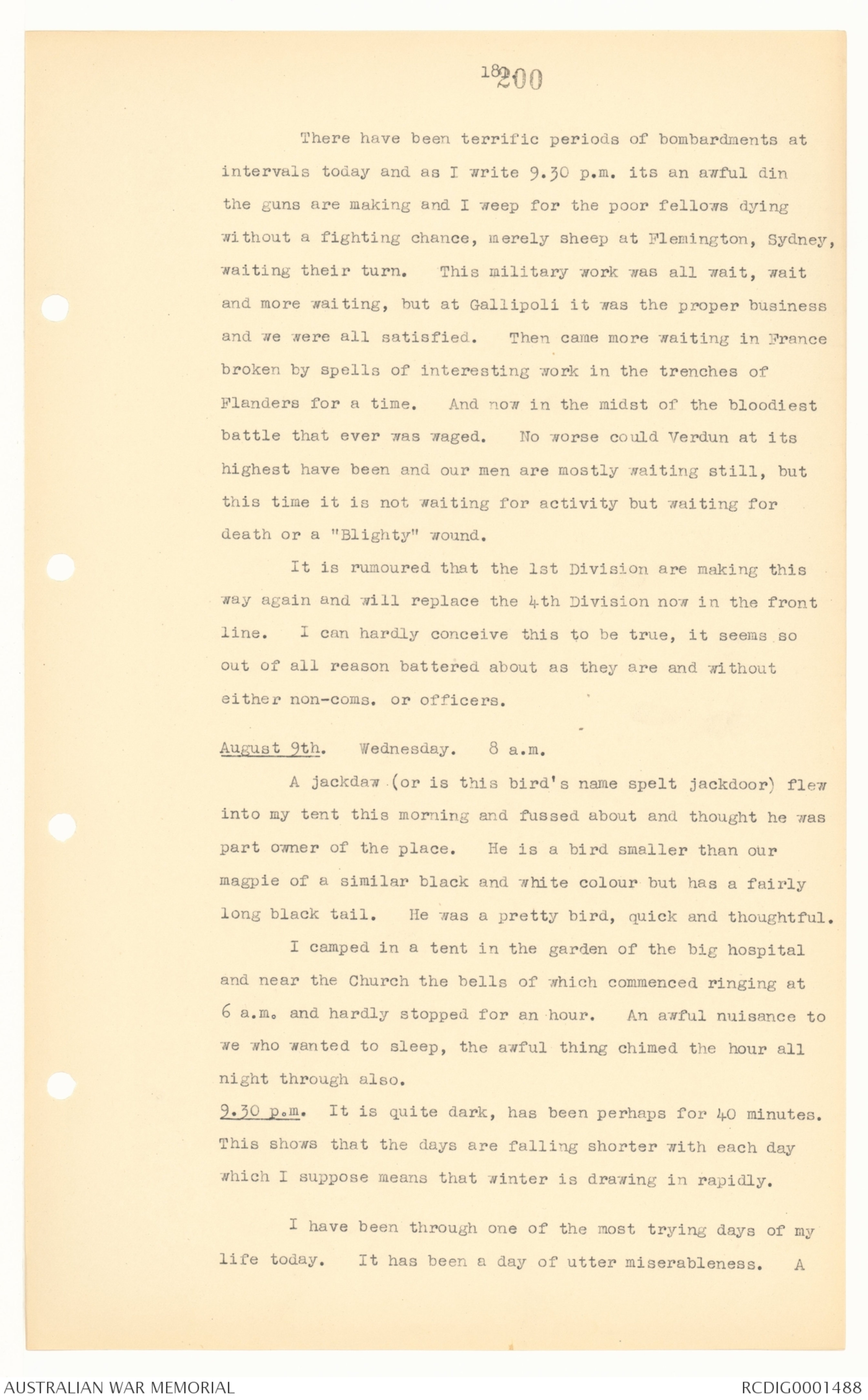
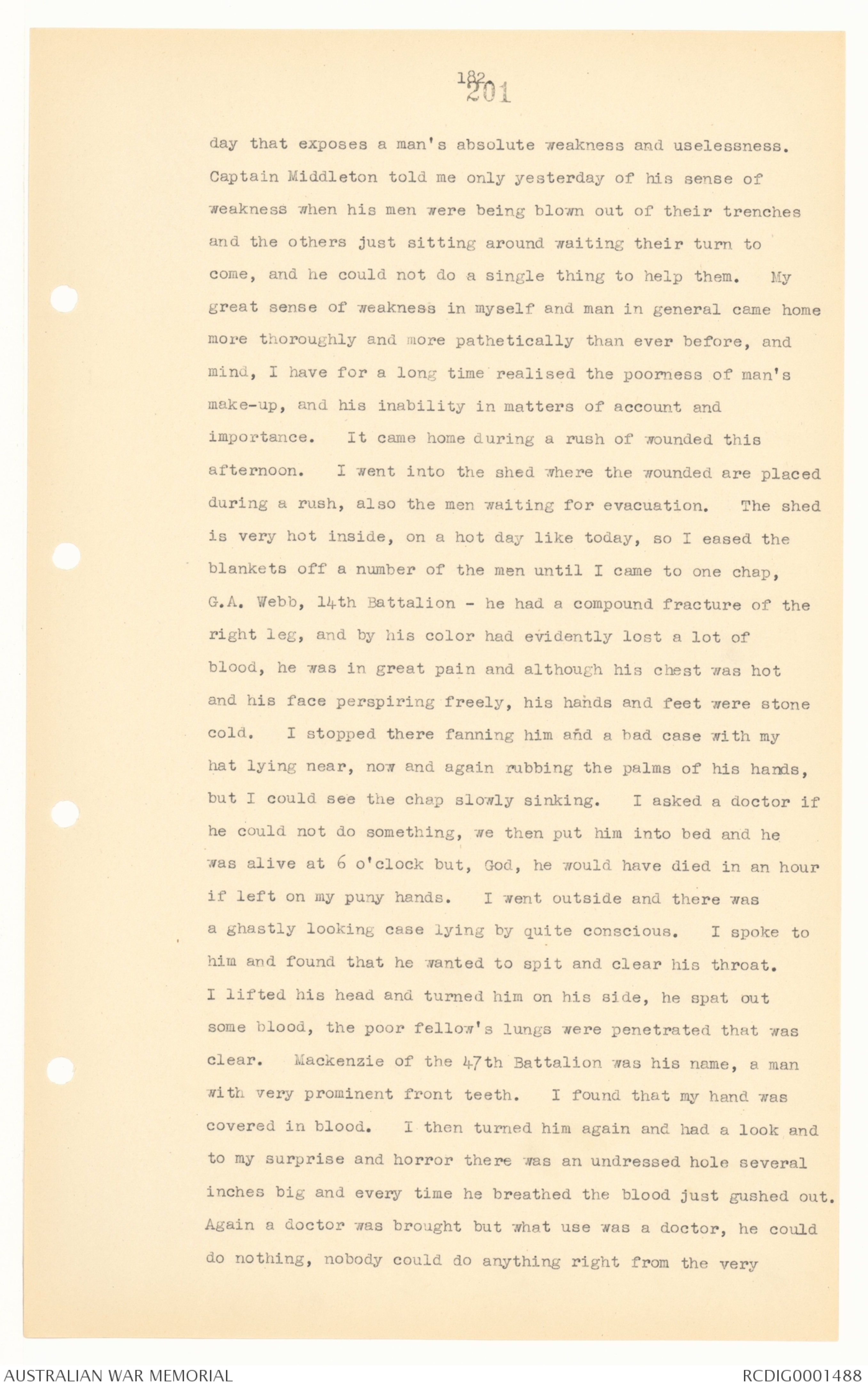
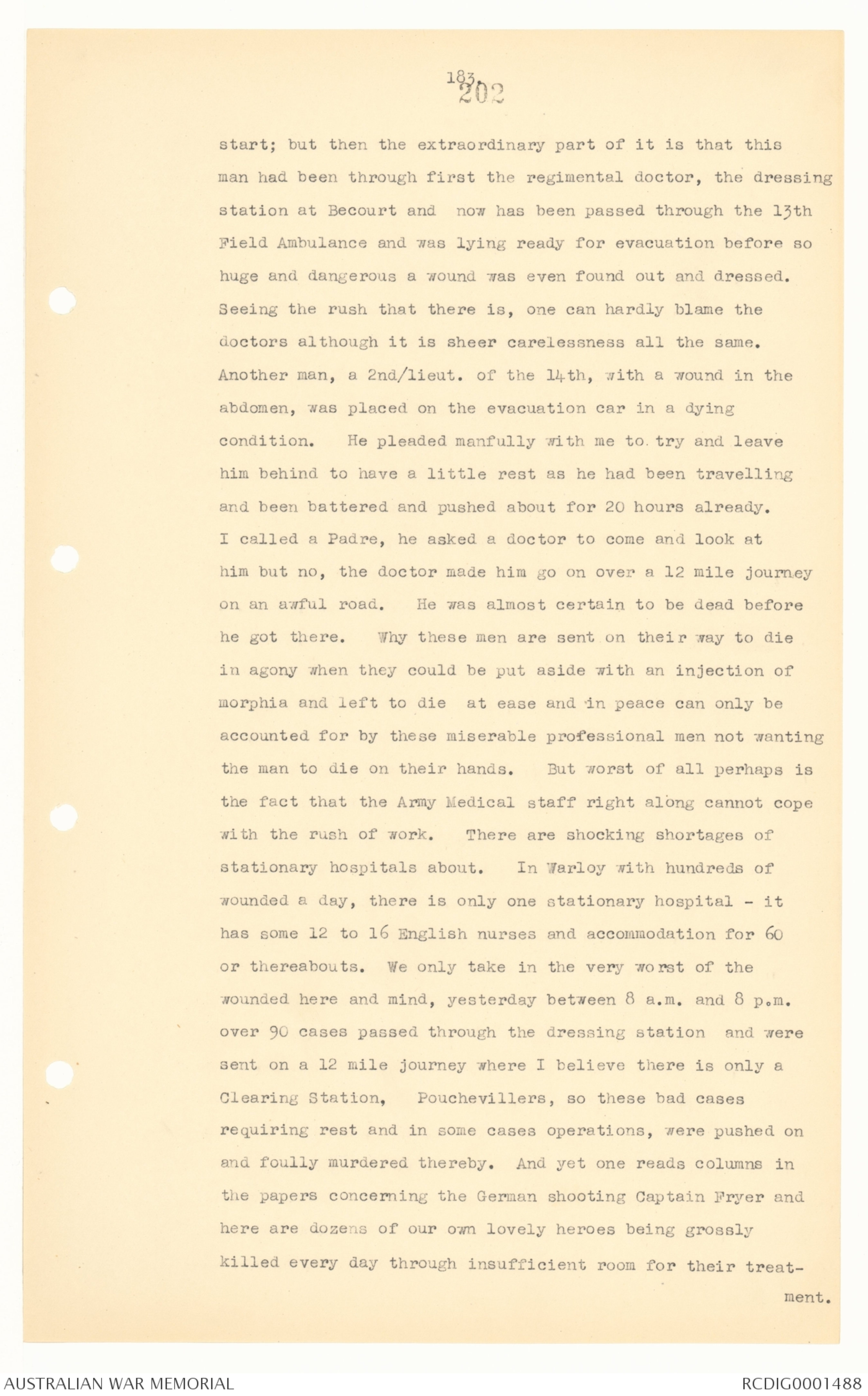
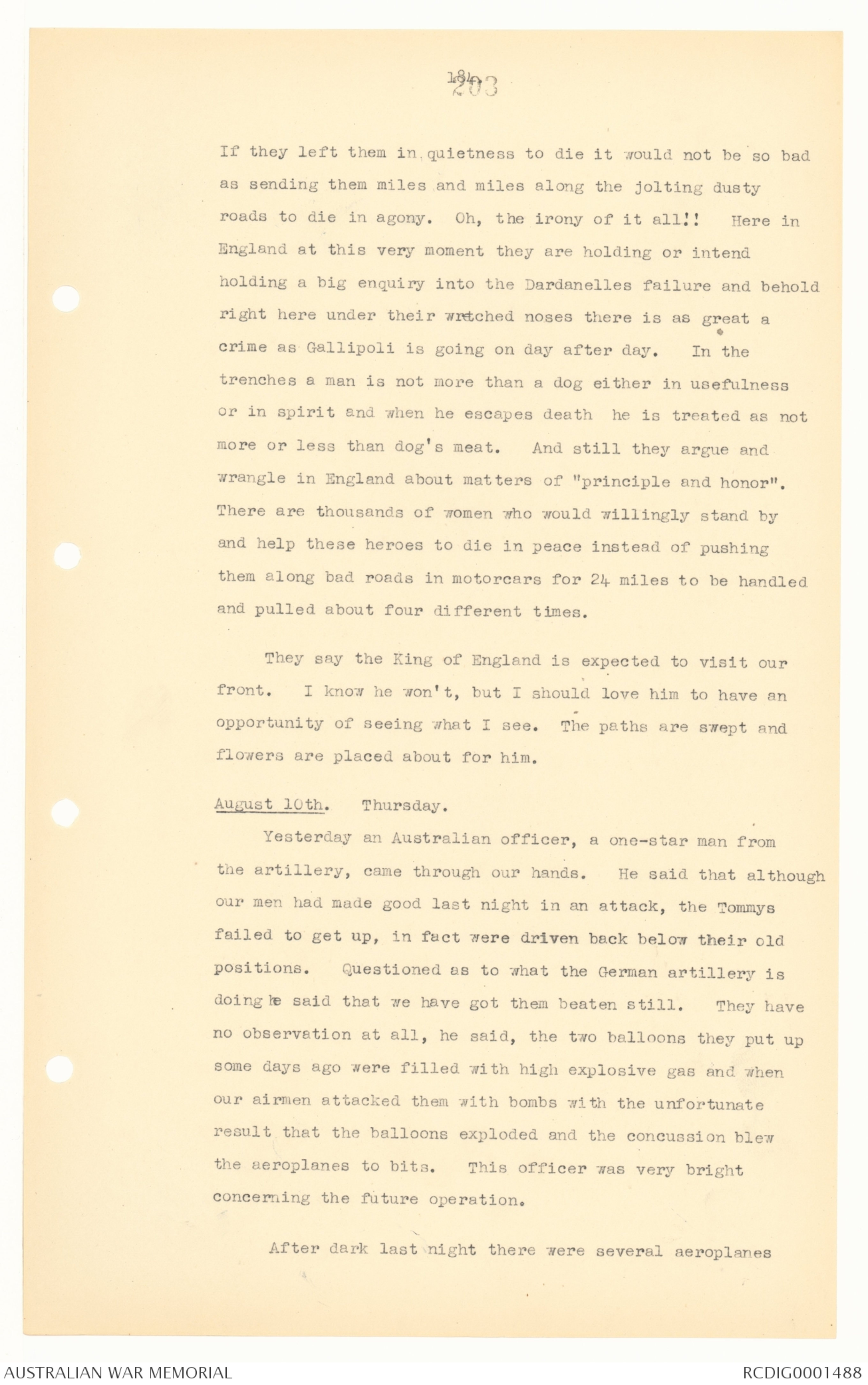
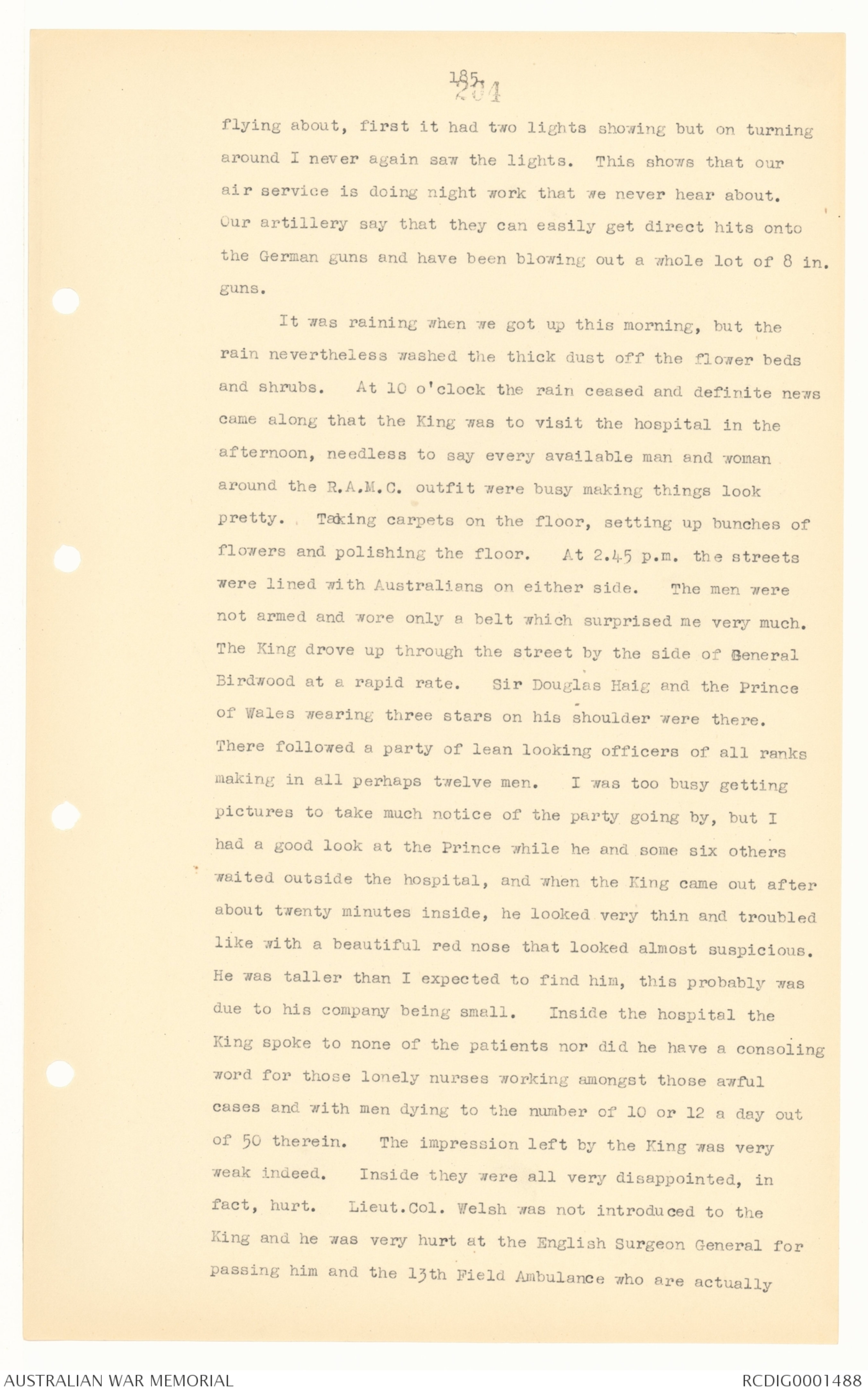
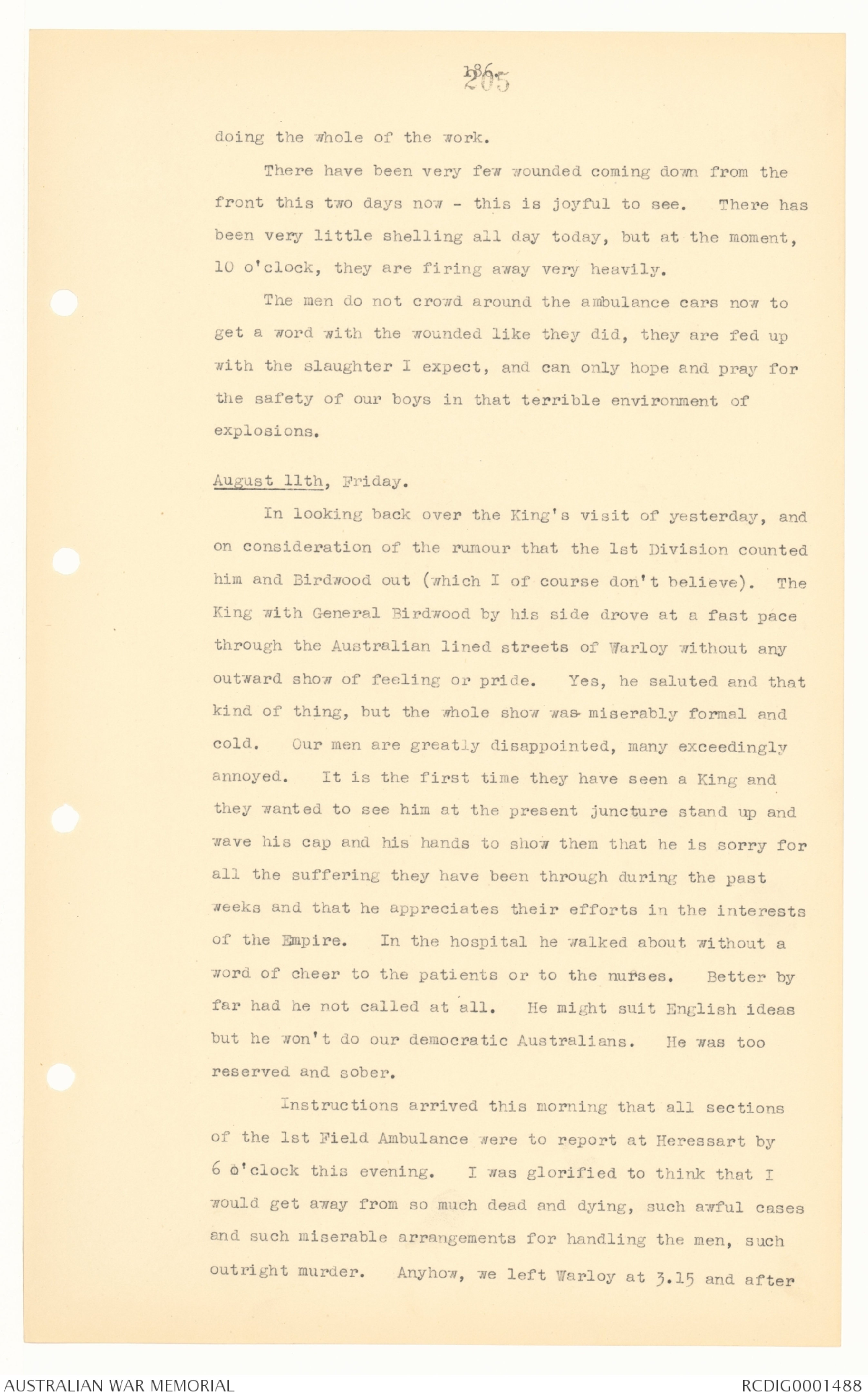
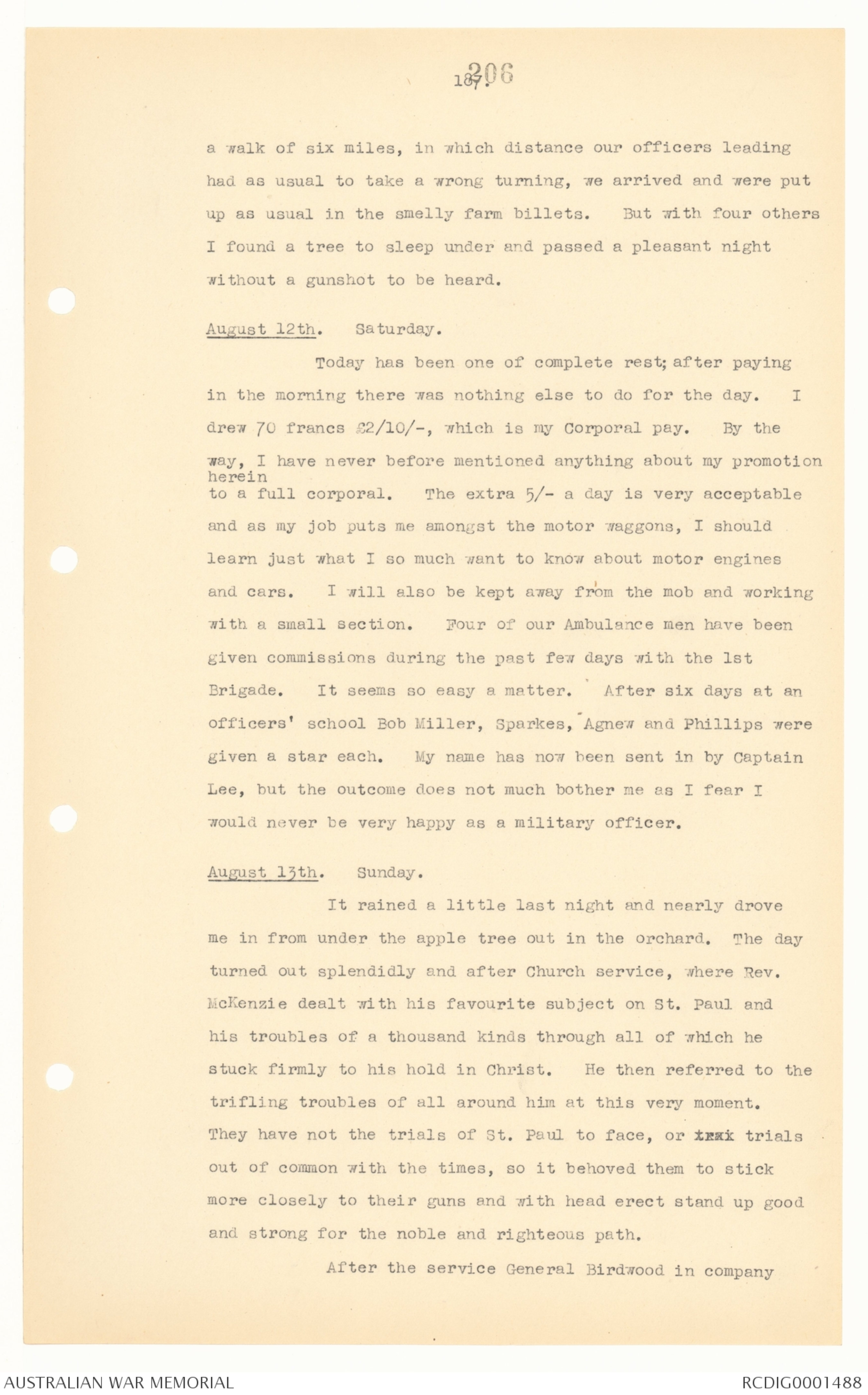
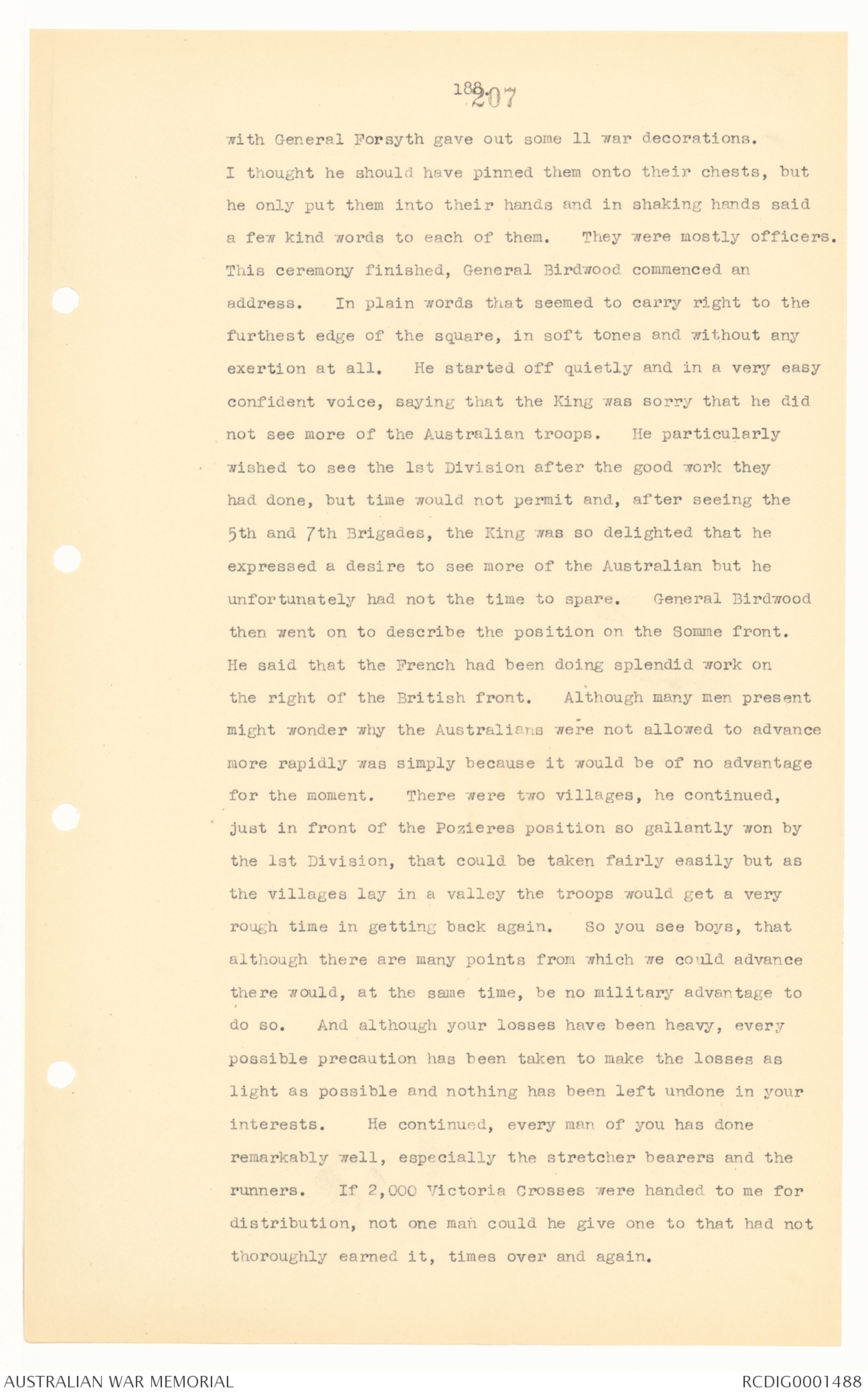
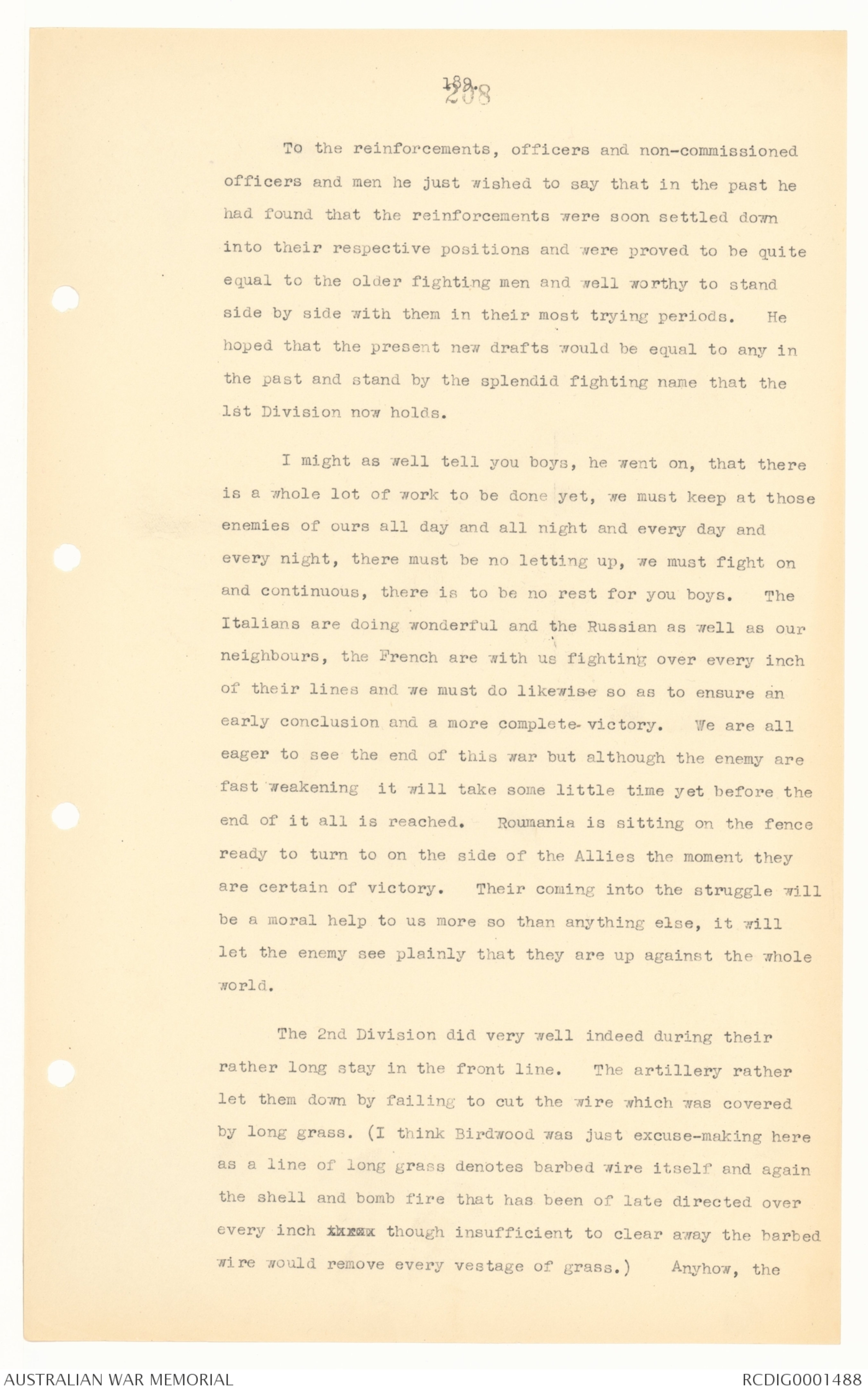
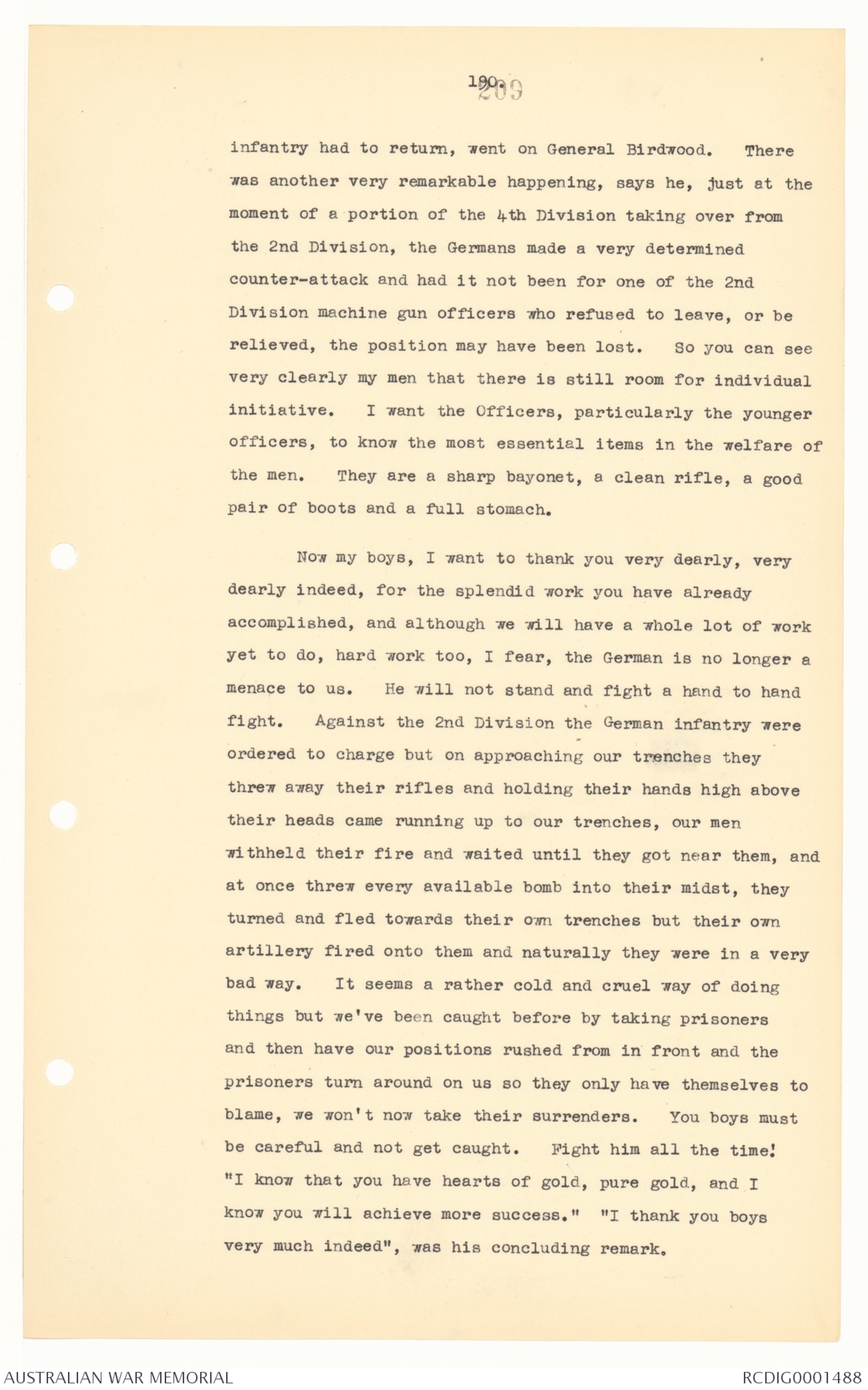
181. 200
There have been terrific periods of bombardments at
intervals today and as I write 9.30 p.m. its an awful din
the guns are making and I weep for the poor fellows dying
without a fighting chance, merely sheep at Flemington, Sydney,
waiting their turn. This military work was all wait, wait
and more waiting, but at Gallipoli it was the proper business
and we were all satisfied. Then came more waiting in France
broken by spells of interesting work in the trenches of
Flanders for a time. And now in the midst of the bloodiest
battle that ever was waged. No worse could Verdun at its
highest have been and our men are mostly waiting still, but
this time it is not waiting for activity but waiting for
death or a "Blighty" wound.
It is rumoured that the 1st Division are making this
way again and will replace the 4th Division now in the front
line. I can hardly conceive this to be true, it seems so
out of all reason battered about as they are and without
either non-coms. or officers.
August 9th. Wednesday. 8 a.m.
A jackdaw (or is this bird's name spelt jackdoor) flew
into my tent this morning and fussed about and thought he was
part owner of the place. He is a bird smaller than our
magpie of a similar black and white colour but has a fairly
long black tail. He was a pretty bird, quick and thoughtful.
I camped in a tent in the garden of the big hospital
and near the Church the bells of which commenced ringing at
6 a.m. and hardly stopped for an hour. An awful nuisance to
we who wanted to sleep, the awful thing chimed the hour all
night through also.
9.30 p.m. It is quite dark, has been perhaps for 40 minutes.
This shows that the days are falling shorter with each day
which I suppose means that winter is drawing in rapidly.
I have been through one of the most trying days of my
life today. It has been a day of utter miserableness. A
182. 201
day that exposes a man's absolute weakness and uselessness.
Captain Middleton told me only yesterday of his sense of
weakness when his men were being blown out of their trenches
and the others just sitting around waiting their turn to
come, and he could not do a single thing to help them. My
great sense of weakness in myself and man in general came home
more thoroughly and more pathetically than ever before, and
mind, I have for a long time realised the poorness of man's
make-up, and his inability in matters of account and
importance. It came home during a rush of wounded this
afternoon. I went into the shed where the wounded are placed
during a rush, also the men waiting for evacuation. The shed
is very hot inside, on a hot day like today, so I eased the
blankets off a number of the men until I came to one chap,
G.A. Webb, 14th Battalion - he had a compound fracture of the
right leg, and by his color had evidently lost a lot of
blood, he was in great pain and although his chest was hot
and his face perspiring freely, his hands and feet were stone
cold. I stopped there fanning him and a bad case with my
hat lying near, now and again rubbing the palms of his hands,
but I could see the chap slowly sinking. I asked a doctor if
he could not do something, we then put him into bed and he
was alive at 6 o'clock but, God, he would have died in an hour
if left on my puny hands. I went outside and there was
a ghastly looking case lying by quite conscious. I spoke to
him and found that he wanted to spit and clear his throat.
I lifted his head and turned him on his side, he spat out
some blood, the poor fellow's lungs were penetrated that was
clear. Mackenzie of the 47th Battalion was his name, a man
with very prominent front teeth. I found that my hand was
covered in blood. I then turned him again and had a look and
to my surprise and horror there was an undressed hole several
inches big and every time he breathed the blood just gushed out.
Again a doctor was brought but what use was a doctor, he could
do nothing, nobody could do anything right from the very
183. 202
start; but then the extraordinary part of it was that this
man had been through first the regimental doctor, the dressing
station at Becourt and now has been passed through the 13th
Field Ambulance and was lying ready for evacuation before so
huge and dangerous a wound was even found out and dressed.
Seeing the rush that there is, one can hardly blame the
doctors although it is sheer carelessness all the same.
Another man, a 2nd/lieut. of the 14th with a wound in the
abdomen, was placed on the evacuation car in a dying
condition. He pleaded manfully with me to try and leave
him behind to have a little rest as he had been travelling
and been battered and pushed about for 20 hours already.
I called a Padre, he asked a doctor to come and look at
him but no, the doctor made him go on over a 12 mile journey
on an awful road. He was almost certain to be dead before
he got there. Why these men are sent on their way to die
in agony when they could be put aside with an injection of
morphia and left to die at ease and in peace can only be
accounted for by these miserable professional men not wanting
the man to die on their hands. But worst of all perhaps is
the fact that the Army Medical staff right along cannot cope
with the rush of work. There are shocking shortages of
stationary hospitals about. In Warloy with hundreds of
wounded a day, there is only one stationary hospital - it
has some 12 to 16 English nurses and accommodation for 60
or thereabouts. We only take in the very worst of the
wounded here and mind, yesterday between 8 a.m. and 8 p.m.
over 90 cases passed through the dressing station and were
sent on a 12 mile journey where I believe there is only a
Clearing Station, Pouchevillers, so these bad cases
requiring rest and in some cases operations, were pushed on
and foully murdered thereby. And yet one reads columns in
the papers concerning the German shooting Captain Fryer and
here are dozens of our own lovely heroes being grossly
killed every day through insufficient room for their treatment.
184. 203
If they left them in quietness to die it would not be so bad
as sending them miles and miles along the jolting dusty
roads to die in agony. Oh, the irony of it all!! Here in
England at this very moment they are holding or intend
holding a big enquiry into the Dardanelles failure and behold
right here under their wretched noses there is as great a
crime as Gallipoli is going on day after day. In the
trenches a man is not more than a dog either in usefulness
or in spirit and when he escapes death he is treated as not
more or less than dog's meat. And still they argue and
wrangle in England about matters of "principle and honor".
There are thousands of women who would willingly stand by
and help these heroes to die in peace instead of pushing
them along bad roads in motorcars for 24 miles to be handled
and pulled about four different times.
They say the King of England is expected to visit our
front. I know he won't, but I should love him to have an
opportunity of seeing what I see. The paths are swept and
flowers are placed about for him.
August 10th. Thursday.
Yesterday an Australian officer, a one-star man from
the artillery, came through our hands. He said that although
our men had made good last night in an attack, the Tommys
failed to get up, in fact were driven back below their old
positions. Questioned as to what the German artillery is
doing he said that we have got them beaten still. They have
no observation at all, he said, the two balloons they put up
some days ago were filled with high explosive gas and when
our airmen attacked them with bombs with the unfortunate
result that the balloons exploded and the concussion blew
the aeroplanes to bits. This officer was very bright
concerning the future operation.
After dark last night there were several aeroplanes
185. 204
flying about, first it had two lights showing but on turning
around I never again saw the lights. This shows that our
air service is doing night work that we never hear about.
Our artillery say that they can easily get direct hits onto
the German guns and have been blowing out a whole lot of 8 in.
guns.
It was raining when we got up this morning, but the
rain nevertheless washed the thick dust off the flower beds
and shrubs. At 10 o'clock the rain ceased and definite news
came along, that the King was to visit the hospital in the
afternoon, needless to say every available man and woman
around the R.A.M.C. outfit were busy making things look
pretty. Taking carpets on the floor, setting up bunches of
flowers and polishing the floor. At 2.45 p.m. the streets
were lined with Australians on either side. The men were
not armed and wore only a belt which surprised me very much.
The King drove up through the street by the side of General
Birdwood at a rapid rate. Sir Douglas Haig and the Prince
of Wales wearing three stars on his shoulder were there.
There followed a party of lean looking officers of all ranks
making in all perhaps twelve men. I was too busy getting
pictures to take much notice of the party going by, but I
had a good look at the Prince while he and some six others
waited outside the hospital, and when the King came out after
about twenty minutes inside, he looked very thin and troubled
like with a beautiful red nose that looked almost suspicious.
He was taller than I expected to find him, this probably was
due to his company being small. Inside the hospital the
King spoke to none of the patients nor did he have a consoling
word for those lonely nurses working amongst those awful
cases and with men dying to the number 10 or 12 a day out
of 50 therein. The impression left by the King was very
weak indeed. Inside they were all very disappointed, in
fact hurt. Lieut. Col. Welsh was not introduced to the
King and he was very hurt at the English Surgeon General for
passing him and the 13th Field Ambulance who are actually
186. 205
doing the whole of the work.
There have been very few wounded coming down from the
front this two days now - this is joyful to see. There has
been very little shelling all day today, but at the moment,
10 o'clock, they are firing away very heavily.
The men do not crowd around the ambulance cars now to
get a word with the wounded like they did, they are fed up
with the slaughter I expect, and can only hope and pray for
the safety of our boys in that terrible environment of
explosions.
August 11th. Friday.
In looking back over the King's visit of yesterday, and
on consideration of the rumour that the 1st Division counted
him and Birdwood out (which I of course don't believe). The
King with General Birdwood by his side drove at a fast pace
through the Australian lined streets of Warloy without any
outward show of feeling or pride. Yes, he saluted and that
kind of thing, but the whole show was miserably formal and
cold. Our men are greatly disappointed, many exceedingly
annoyed. It is the first time they have seen a King and
they wanted to see him at the present juncture stand up and
wave his cap and his hands to show them that his is sorry for
all the suffering they have been through during the past
weeks and that he appreciates their efforts in the interests
of the Empire. In the hospital he walked about without a
word of cheer to the patients or to the nurses. Better by
far had he not called at all. He might suit English ideas
but he won't do our democratic Australians. He was to
reserved and sober.
Instructions arrived this morning that all sections
of the 1st Field Ambulance were to report to Heressart by
6 o'clock this evening. I was glorified to think that I
would get away from so much dead and dying, such awful cases
and such miserable arrangements for handling the men, such
outright murder. Anyhow, we left Warloy at 3.15 and after
187. 206
a walk of six miles, in which distance our officers leading
had as usual to take a wrong turning, we arrived and were put
up as usual in the smelly farm billets. But with four others
I found a tree to sleep under and passed a pleasant night
without a gunshot being heard.
August 12th. Saturday.
Today has been one of complete rest; after paying
in the morning there was nothing else to do for the day. I
drew 70 francs £2/10/-, which is my Corporal pay. By the
way, I have never before mentioned anything about my promotion
herein to a full corporal. The extra 5/- a day is very acceptable
and as my job puts me amongst the motor waggons, I should
learn just what I so much want to know about motor engines
and cars. I will also be kept away from the mob and working
with a small section. Four of our Ambulance men have been
given commissions during the past few days with the 1st
Brigade. It seems so easy a matter. After six days at an
officers' school Bob Miller, Sparkes, Agnew and Phillips were
given a star each. My name has now been sent in by Captain
Lee, but the outcome does not much bother me as I fear I
would never be very happy as a military officer.
August 13th. Sunday
It rained a little last night and nearly drove
me in from under the apple tree out in the orchard. The day
turned out splendidly and after Church service, where Rev.
McKenzie dealt with his favourite subject on St. Paul and
his troubles of a thousand kinds through all of which he
stuck firmly to his hold in Christ. He then referred to the
trifling troubles of all around him at this very moment.
They have not the trials of St. Paul to face, or xxxx trials
out of common with the times, so it behoved them to stick
more closely to their guns and with head erect stand up good
and strong for the noble and righteous path.
After the service General Birdwood in company
188. 207
with General Forsyth gave out some 11 war decorations.
I thought he should have pinned them onto their chests, but
he only put them in their hands and in shaking hands said
a few kind words to each of them. They were mostly officers.
This ceremony finished, General Birdwood commenced an
address. In plain words that seemed to carry right to the
furthest edge of the square, in soft tones and without any
exertion at all. He started off quietly and in a very easy
confident voice, saying that the King was sorry that he did
not see more of the Australian troops. He particularly
wished to see the 1st Division after the good work they
had done, but time would not permit and, after seeing the
5th and the 7th Brigades, the King was so delighted that he
expressed a desire to see more of the Australian but he
unfortunately had not the time to spare. General Birdwood
then went on to describe the position on the Somme front.
He said that the French had been doing splendid work on
the right of the British front. Although many men present
might wonder why the Australians were not allowed to advance
more rapidly was simply because it would be of no advantage
for the moment. There were two villages, he continued,
just in front of the Pozieres position so gallantly won by
the 1st Division, that could be taken fairly easily but as
the villages lay in a valley the troops would get a very
rough time in getting back again. So you see boys, that
although there are many points from which we could advance
there would, at the same time, be no military advantage to
do so. And although your losses have been heavy, every
possible precaution has been taken to make the losses as
light as possible and nothing has been left undone in your
interests. He continued, every man of you has done
remarkably well, especially the stretcher bearers and the
runners. If 2,000 Victoria Crosses were handed to me for
distribution, not one man could he give one to that had not
thoroughly earned it, times over and again.
189. 208
To the reinforcements, officers and non-commissioned
officers and men he just wished to say that in the past he
had found that the reinforcements were soon settled down
into their respective positions and were proved to be quite
equal to the older fighting men and well worthy to stand
side by side with them in their most trying periods. He
hoped that the present new drafts would be equal to any in
the past and stand by the splendid fighting name that the
1st Division now holds.
I might as well tell you boys, he went on, that there
is a whole lot of work to be done yet, we must keep at those
enemies of ours all day and all night and every day and
every night, there must be not letting up, we must fight on
and continuous, there is to be no rest for you boys. The
Italians are doing wonderful and the Russian as well as our
neighbours, the French are with us fighting over every inch
of their lines and we must do likewise so as to ensure an
early conclusion and a more complete victory. We are all
eager to see the end of this war but although the enemy are
fast weakening it will take some little time yet before the
end of it all is reached. Roumania is sitting on the fence
ready to turn to on the side of the Allies the moment they
are certain of victory. Their coming into the struggle will
be a moral help to us more so than anything else, it will
let the enemy see plainly that they are up against the whole
world.
The 2nd Division did very well indeed during their
rather long stay in the front line. The artillery rather
let them down by failing to cut the wire which was covered
by long grass. (I think Birdwood was just excuse-making here
as a line of long grass denotes barbed wire itself and again
the shell and bomb fire that has been of late directed over
every inch xxxxx though insufficient to clear away the barbed
wire would remove every vestage of grass.) Anyhow, the
190. 209
infantry had to return, went on General Birdwood. There
was another very remarkable happening, says he, just at the
moment of a portion of the 4th Division taking over from
the 2nd Division, the Germans made a very determined
counter-attack and had it not been for one of the 2nd
Division machine gun officers who refused to leave, or be
relieved, the position may have been lost. So you can see
very clearly my men that there is still room for individual
initiative. I want the Officers, particularly the younger
officers, to know the most essential items in the welfare of
the men. They are a sharp bayonet, a clean rifle, a good
pair of boots and a full stomach.
Now my boys, I want to thank you very dearly, very
dearly indeed, for the splendid work you have already
accomplished, and although we will have a whole lot of work
yet to do, hard work too, I fear, the German is no longer a
menace to us. He will not stand and fight a hand to hand
fight. Against the 2nd Division the German infantry were
ordered to charge but on approaching our trenches they
threw away their rifles and holding their hands high above
their heads came running up to our trenches, our men
withheld their fire and waited until they got near them, and
at once threw every available bomb into their midst, they
turned and fled towards their own trenches but their own
artillery fired onto them and naturally they were in a very
bad way. It seems a rather cold and cruel way of doing
things but we've been caught before by taking prisoners
and then have our positions rushed from in front and the
prisoners turn around on us so they only have themselves to
blame, we won't now take their surrenders. You boys must
be careful and not get caught. Fight him all the time!
"I know that you have hearts of gold, pure gold, and I
know you will achieve more success." "I thank you boys
very much indeed", was his concluding remark.
 Sam scott
Sam scottThis transcription item is now locked to you for editing. To release the lock either Save your changes or Cancel.
This lock will be automatically released after 60 minutes of inactivity.